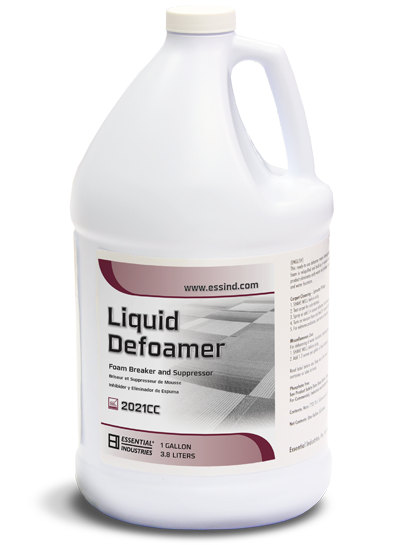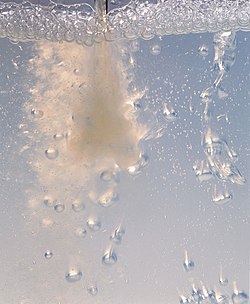Discover the Leading Reasons You Required a Chemical Defoamer for Effective Foam Control
Chemical defoamers serve as vital representatives that minimize foam development, consequently boosting processes in markets such as food manufacturing, pharmaceuticals, and wastewater therapy. As we check out the multifaceted advantages of chemical defoamers, it becomes apparent that their function expands past mere foam decrease, impacting general performance in methods that may not be promptly noticeable.
Improved Functional Efficiency
The existence of foam can hinder manufacturing by obstructing tools, minimizing ability, and making complex process control. By lowering surface area stress, they help with the quick collapse of foam, enabling for smoother operation and reducing downtime.
In sectors such as food and drink, pharmaceuticals, and wastewater treatment, the application of defoamers enhances procedure stability and product top quality. In fermentation procedures, controlling foam generation is essential for taking full advantage of return and efficiency. Furthermore, the usage of defoamers can result in more effective blending and aeration, resulting in boosted response times and overall efficiency.
In addition, when foam is efficiently controlled, it decreases the risk of overflow and contamination, guaranteeing compliance with security and quality standards. This not just simplifies procedures however likewise permits better resource application. Ultimately, the combination of chemical defoamers right into industrial processes fosters a more reliable process, enhancing outcome while keeping premium requirements. Therefore, their function in improving functional effectiveness can not be overstated.
Price Financial Savings and Source Monitoring

Additionally, using defoamers enhances the performance of raw product usage. In numerous applications, excessive foam can create overuse of chemicals, bring about unneeded costs. By regulating foam levels, businesses can enhance their chemical input, thereby lowering functional expenses. This not only adds to monetary savings however additionally advertises lasting practices by lowering waste.
In addition, reduced foam in processing systems can enhance the total throughput, allowing facilities to boost manufacturing capability without sustaining additional prices - Chemical Defoamer. This efficient source administration translates right into substantial economic advantages, allowing companies to designate funds toward innovation or expansion. In recap, the assimilation of chemical defoamers right into commercial procedures fosters an extra resource-efficient and economical environment, ultimately supporting organizational growth and sustainability
Improved Item Quality

Using chemical defoamers plays an essential duty in boosting item top quality throughout numerous markets. Too much foam can lead to irregular product solutions, influencing the final characteristics of items such as paints, coverings, food products, and drugs. By minimizing foam you can try these out development, chemical defoamers facilitate smoother manufacturing processes, guaranteeing that formulations continue to be consistent and fulfill specific top quality criteria.
In the food and drink industry, for example, the visibility of foam can affect the clearness and preference of items, eventually affecting customer satisfaction. Chemical defoamers help maintain the preferred texture and appearance, thus enhancing the general top quality of the final item. In the production of finishings and paints, foam can lead to defects such as pinholes and inadequate bond, weakening the product's performance.
Furthermore, making use of defoamers can enhance the performance of procedures like fermentation and emulsification, which are important for achieving preferred item characteristics. By simplifying production and making certain consistent quality, chemical defoamers not just improve the end product yet additionally contribute to a favorable brand name he said credibility. Thus, spending in efficient foam control remedies is necessary for any kind of service aiming to deliver top notch products regularly.
Equipment Defense and Longevity
Decreasing foam production is necessary for securing tools and guaranteeing its long life in various industrial applications. Extreme foam can lead to a series of functional issues, consisting of devices damages, raised upkeep expenses, and unplanned downtime. When foam accumulates, it can trigger overflow, bring about spills that jeopardize the honesty of equipment and bordering areas.
Furthermore, foam can obstruct sensors and pumps, which can prevent performance and effectiveness. In serious instances, it can cause the break down of elements, necessitating pricey repairs or replacements. By using a chemical defoamer, business can effectively alleviate foam development, therefore securing their devices from the harmful effects of foam-related concerns.
In enhancement to avoiding damage, reliable foam control can considerably boost the operational life-span of equipment. Investing in a quality chemical defoamer is a positive approach for protecting devices and cultivating long additional info life in industrial settings.
Adaptability Across Industries
Chemical defoamers play a crucial role in numerous industries, effectively dealing with foam-related difficulties across varied applications. Their adaptability appears in sectors such as food and drink, pharmaceuticals, and wastewater treatment, where foam can lower and restrain procedures performance. In the food sector, defoamers make certain smooth production by protecting against foam formation throughout mixing, fermentation, and bottling, thereby preserving item top quality and uniformity.

Additionally, in wastewater treatment centers, chemical defoamers are employed to manage foam throughout the aeration process, promoting ideal microbial task and boosting the overall therapy efficiency. Their capacity to work effectively in high-temperature and high-shear atmospheres further emphasizes their adaptability.
Final Thought
In final thought, the usage of chemical defoamers is imperative for efficient foam control throughout various markets. The versatility of defoamers enables for widespread application in food production, drugs, and wastewater treatment, ultimately contributing to sustainable growth and the upkeep of high functional requirements (Chemical Defoamer).
Chemical defoamers serve as necessary agents that mitigate foam formation, therefore boosting processes in fields such as food manufacturing, pharmaceuticals, and wastewater treatment. As we explore the diverse benefits of chemical defoamers, it ends up being apparent that their duty prolongs past mere foam reduction, impacting total efficiency in methods that may not be instantly noticeable.
By alleviating foam formation, chemical defoamers facilitate smoother manufacturing procedures, guaranteeing that formulas remain uniform and meet specific high quality standards.
By making use of a chemical defoamer, companies can effectively reduce foam development, therefore securing their devices from the harmful results of foam-related problems.
In conclusion, the application of chemical defoamers is necessary for efficient foam control throughout numerous sectors.